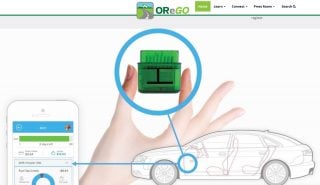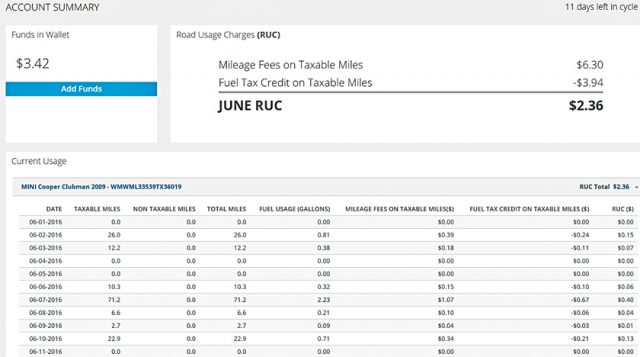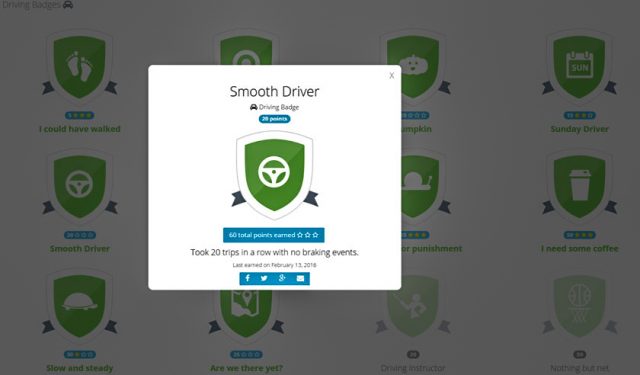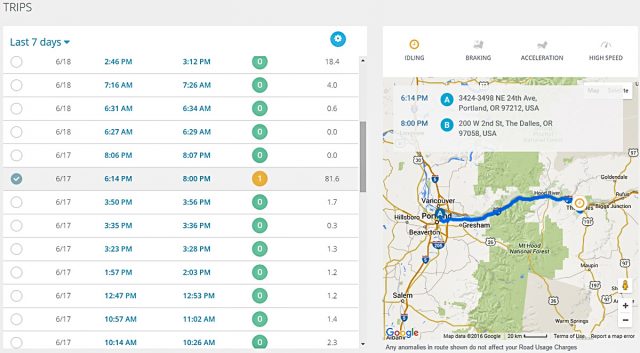This post is written by Jerry “AJ” Zelada, a Portland-based optometrist, citizen advocate, and former chair of the Oregon Bicycle and Pedestrian Advisory Committee.
I am one of the 891 users of OreGo (the State of Oregon’s experimental new road tax program) who paid the road use tax this past year. As readers here might recall, I was critical of the gas tax increase because the consumption of this resource is declining and will decline even further as auto and light truck efficiency increases and electric car numbers increase. And while I did vote for it, I am still opposed to taxing a resource rather than taxing actual use.
The OreGo program is a good tax mechanism. The program uses a simple plug-in device that measures miles driven. You are taxed 1.5 cents a mile and given credit for your expected payment at the pump. It is subtracted from a simple ‘wallet’ account. OreGo is also about data. It produces solid information about usage beyond miles driven; but the focus is so motor-vehicle oriented, we may miss including tax income for active transportation needs.
The origins of OreGo
I was first introduced to OreGo in 2008 when I sat on the Sustainability Transportation Initiative Committee (Senate Bill 1059). A presenter told us about congestion taxation pricing: They could map people and tax drivers who were using specific highways at specific times. The software could track behavior which causes reduced road capacity: entering one exit, changing lanes to the fast lane and then back to the slow exit lane only one exit later. And with a devious smile, he said these behaviors could be taxed differentially. This was music to my ears and parallel to the notion of industry charge-backs: more pollution you pay more; less pollution you get credits. It is a tribute to a few that the program actually continued to get developed over seven years and is now being considered as something viable.
The benefits of data
There are some secondary benefits that can accompany this program. I can log into my account and see my own behavior: jack-rabbit starts; hard braking; a map of every trip my car has made. It even asks me, Why didn’t you walk for such a short drive? My MapMyRide and Strava do the same thing: nag that today’s average speed was 11.5 rather than 12 miles an hour. There are more possibilities for this Black Box of road use: assess pre-crash data, document erratic behavior for solo deaths due to distraction, find stolen cars, find lost elders, parental tracking of kids, or track employee behaviors using company vehicles. These are individual issues.
Another secondary benefit is aggregate information that can assist policy decisions; where to spend money to ameliorate congestion, creating incentives for staggered employee arrivals, etc. Imagine plotting all the three-mile or shorter trips and find that people drove instead of walked due to poor lane crossings. OreGo can collect substantial information that could reveal community patterns not understood. It is a possibility that the Oregon Department of Transportation (ODOT) would see how widening roads may not be the answer when other options could pull those ‘three mile trip drivers’ away from large arterials.
The program is a good first step. Taxing real use catches up where gas consumption only tells the purchased gallons. But it comes up short as it still associates vehicles as primary users in defining road use. We still need to redefine transportation as including all users.
Worries
My worries are two-fold. Our information society has a generational information divide and this tax mechanism will confront this.
Uber is the perfect example in our transportation world: Once you click for a ride, you reveal where you are; once you engage the Driver, the Uber corporation knows your phone identity; once you tell the driver where you are going, the charges are reserved against your wallet capturing a financial portal; and of course your final destination is then the book end of this geo-location transaction. I find the fascinating part is that many have no qualms about revealing these data points, but enter a Snowden type of discussion on privacy with the government tracking you and American privacy hypocrisy rises up. People accept if corporations do inspect and track you, but not the government. People will want Waze (navigation phone app) to alert you to traffic jams, but do not want the government to track your whereabouts.
With this new structure for road tax revenue, there needs to be discussion about the allocation of tax dollars. We need to include Active Transportation as part of this discussion. Now is the time to evaluate so that the monies do not become a silo excluding Active Transportation. Wisely, we set up the Bike Bill to allow 1 percent of the state gas tax to funnel money toward bike paths (as they were called in 1971). This was when there were probably only 12 daily bicycle trips across the Hawthorne. Today we still have 1 percent of the money coming in for Active Transportation but we have 15,000 daily bike trips on the bridge.
We need to make sure that ODOT’s Road User Fee Task Force understands that the road is no longer a pavement industry. The road has a new definition regarding reduced traffic speed to reduce deaths, increased arterials for parents to bicycle their children to school and to shop; pedestrian crossings of 6 lanes on 181st; filling in 500 miles of unfinished sidewalks, creating electric bike pathways…on it goes. We have redefined the road. Will the task force be up to date?
And for me, I applaud the members of the Road User Task Force. I have surrendered my privacy to both MapMyRide and OReGo. I believe transportation arterials are public spaces. Having a device attached to each registered vehicle and measuring that vehicle’s use shows many new informational advantages. It could be an elegant simple tax scheme which is not about taxing a decreasing consumption of fuel, but is a tool with a sustainability viewpoint and purpose to tax the causes of pollution, congestion, and greater needed maintenance.
— Jerry Zelada
BikePortland is supported by the community (that means you!). Please become a subscriber or make a donation today.
The post Guest article: My view of “OreGo”, Oregon’s new vehicle mileage tax program appeared first on BikePortland.org.
from Front Page – BikePortland.org http://ift.tt/2cWOzYu




No comments:
Post a Comment